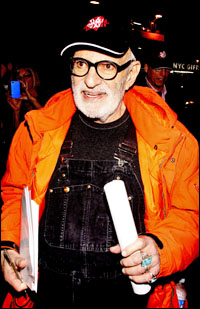
*
The most surprising entry of the 2010-11 Broadway season was the late arrival — very late, late-April late, 26 years late — of The Normal Heart, the seminal 1985 drama about the early years of the AIDS epidemic. And no one was more surprised than its author, Larry Kramer.
"I'm living right now in a world that is a very foreign country to me," says the 75-year-old playwright while sitting in a cluttered Greenwich Village apartment dominated by two huge flat-screen computers and the books and papers of a lifetime of writing and activism. "Sure, it's nice, but I'm all fatootsed."
Anyone would be fatootsed — exhausted and confused, that is — by the whiplash-inducing circumstances that ferried the decades-old play to Broadway. The journey began with a starry reading of the play at L.A.'s Geffen Playhouse in May of 2010. Joel Grey — who played antagonistic protagonist Ned Weeks in the original 1985 production at the Public Theater — directed. He returned to New York and asked producer Daryl Roth to back a similar reading in New York. She agreed. Soon after, Grey ran into Joe Mantello, the Tony-winning director of Wicked who has famously sworn off his former profession of acting. "If you're ever looking for a Ned Weeks," Mantello told Grey, "it's the one part I've never played that I always wanted to."
"When I heard that," recalls Kramer, who remembered seeing Mantello in Angels in America, "I said, 'Go for it.'"
| |
 |
|
| Joe Mantello in The Normal Heart | ||
| photo by Joseph Marzullo/WENN |
"We put this together in 16 days, from the first reading to the first preview," said Kramer on the day of the Broadway opening (his dress for the evening: black overalls), still not quite seeming to believe his luck.
There was talk of a Broadway berth back in 1985, when Joseph Papp produced the play at the Public. The bruising story, set in the early '80s, dramatizes the outbreak of the AIDS crisis in New York and one group of gay men's fight to win recognition of their plight from a seemingly indifferent media and mayor. The action, centered on the irascible, enemy-making firebrand Ned Weeks, is largely drawn from Kramer's own experiences founding — and eventually losing control of — the Gay Men's Health Crisis, now the world's largest private organization assisting people living with AIDS.
"As Is, by William M. Hoffman" — another significant play of the time that dealt with AIDS — "opened right before we did," says Kramer. "Everyone gave it a rave. So As Is went to Broadway. We got just as good reviews...but Joe Papp said, 'As Is is not doing well on Broadway. Here you have a home.' He ran it and ran it. That's why we didn't go to Broadway. And he was probably right."
| |
 |
|
| Kramer handing out fliers about AIDS to audience members after a performance/ | ||
| photo by Joseph Marzullo/WENN |
But there's also the sobering information found in an open letter from Kramer that is handed out to theatregoers as they exit the Golden Theatre. It begins with "Please know that everything in The Normal Heart happened," and continues to explain that 35 million people have died from AIDS, and 75 million have been infected. If the definition of "period play" is a work that examines an era now passed into history, then The Normal Heart doesn't exactly fit the bill.
"Most people think it's gone," says its author. "You don't see any stories in The New York Times about any of the stuff that I've written about in this letter. Indeed, that's why I wrote it. And that's why I'm glad the play is up there. Because everybody thinks AIDS has gone away, and it hasn't."
Some things do change, however. Though still a self-professed "message queen" (and, Ned Weeks-like, he managed to cheerfully criticize several notable stage and film figures during our half-hour-long talk), Kramer has noticeably mellowed... at least enough to not quite see Weeks as a mirror held up to his nature.
"This has been one of the most surreal experiences of my life. I sit there and I say, 'Who is the person who wrote this thing?' I know it's me. But it's a very split personality kind of thing. Do I recognize the characters? This play is full of ghosts. And those ghosts live with me and I still get teary eyed when I watch it. It's hard not to. But who is that person, Ned? I don't know. People who know me say to me, Joe Mantello is acting like me. And he isn't. Joe says, 'I haven't patterned my performance on you at all.' I don't look at him as me. I look at him as Ned Weeks."










